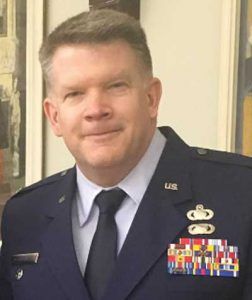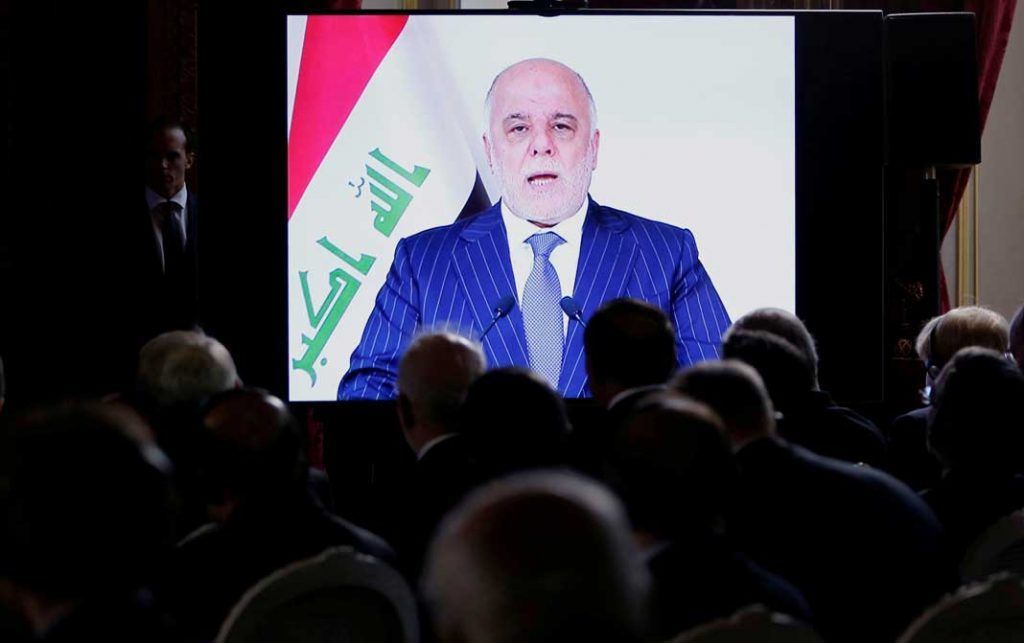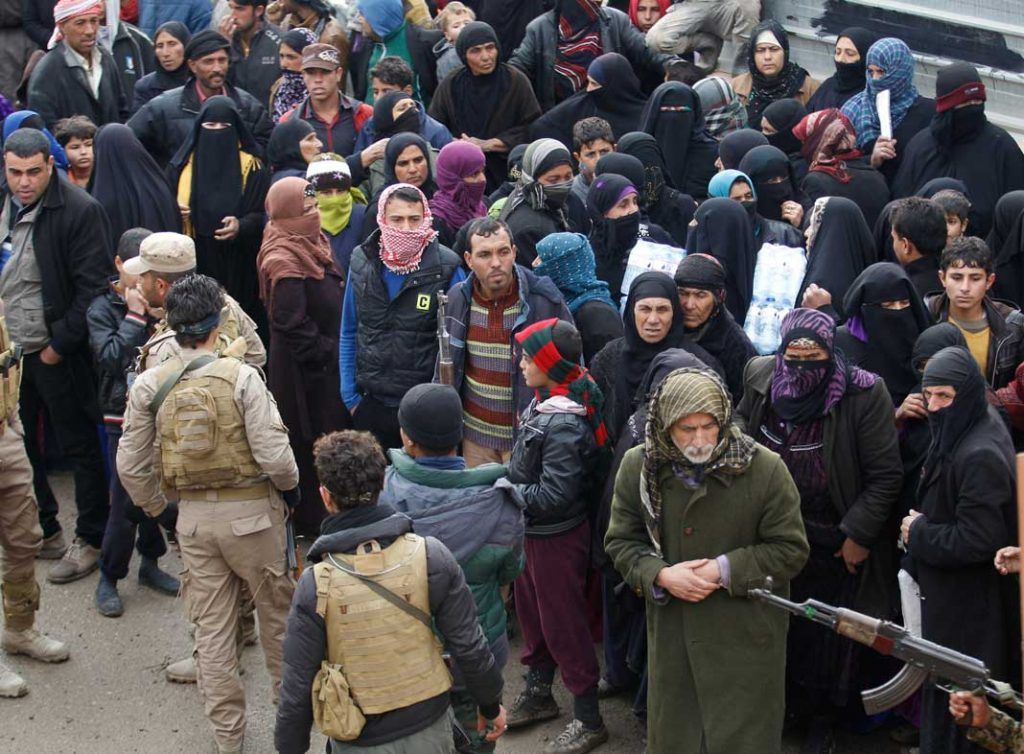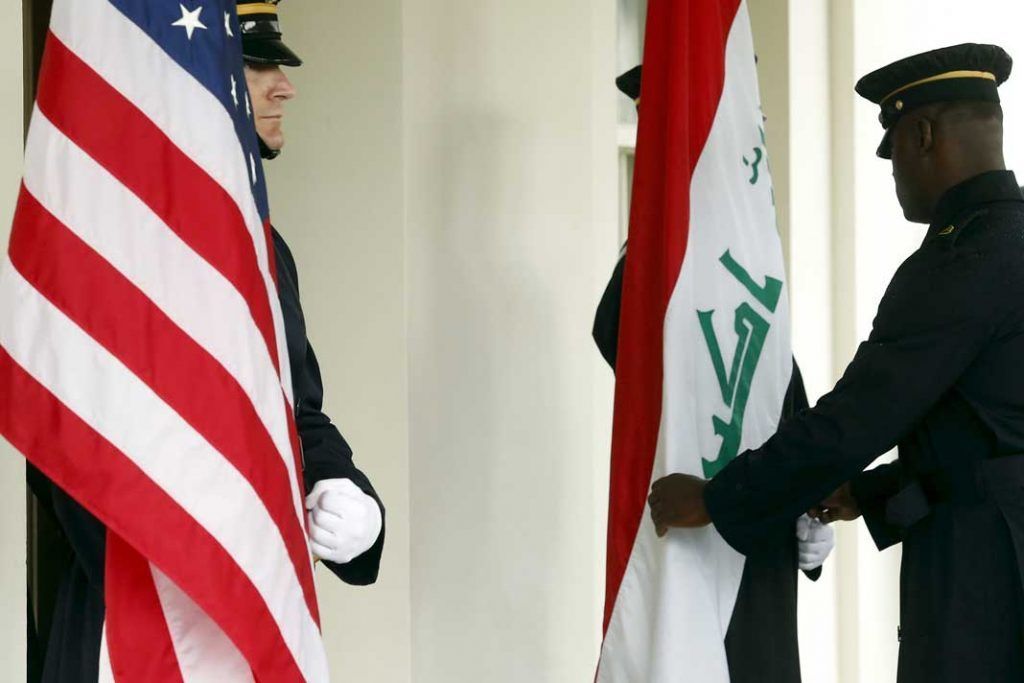December 21, 2016
By Potkin Azarmehr
Colonel John L. Dorrian is the spokesman for the Combined Joint Task Force – Operation Inherent Resolve, U.S. Central Command, which is helping the Iraqi government take back Mosul from the Islamic State of Iraq and the Levant (Daesh). Task Force – Operation Inherent Resolve was established to support Iraqi Security operations against Daesh. Col. Dorrian explained the role of Iran-backed Shia militias in the recapture of Mosul and the current status of Daesh forces in Iraq and Syria.
- “Fifty percent East side of Mosul has been taken back from ISIL”
- “US Contribution for the coalition to fight ISIL has been $12 Bn since 2014”
- “Iran backed Shia militia are fighting alongside Iraqi government forces to recapture Mosul”
- “Coalition has no consultation or co-operation with Iran in terms of planning the Mosul operation”
- “In Aleppo there were very small numbers of DAESH, if any “
- “Palmyra was taken back by ISIL from Syrian regime forces because they had concentrated all their forces to crush opposition in Aleppo”

Col. Dorrian, when did the Combined Joint Task Force – Operation Inherent Resolve begin its operations?
Combined Joint Task Force – Operation Inherent Resolve came into being in 2014 as a response to the advance of Daesh into Syria and Iraq and its lightning capture of vast swaths of territory. At the time they travelled in large groups much like a conventional army and merged with others as they advanced. Their goal was to establish a state in Syria and Iraq. It looked like they were knocking on the gates of Baghdad and that was a very dangerous situation for the entire region and for the world, and so that’s why the task force was set up.
Why do you think Daesh grew so rapidly and gained so much territory?
There are many reasons. The government of Iraq at the time was perceived by Sunnis not to be serving all the people; and, a world view with restrictive fundamentalist ideology that believes anyone who doesn’t share its values is subject to the sword.
Do you think it was just fear or did their objectives resonate with the Sunnis?
I think there was a lot of anger, and when you have a vacuum that has been created by a government that doesn’t serve all the people or it is perceived not to, it creates conditions for the emergence of something like this. You see the civil war in Syria, it is exactly the type of vacuum that organisations like Daesh look for and flourish in.
The motto of the task force is “one mission, many nations.” How many nations are in the joint task force?
The Combined Joint Task Force – Operation Inherent Resolve includes 68 nations and partners that are united in their effort to defeat Daesh. In Iraq and Syria there are less than 30 having military boots on the ground.
Some members of the Task Force, such as Saudi Arabia and Turkey, are widely believed to have helped Daesh, either financially, logistically, or in other ways. How are they part of the coalition and specifically what is their contribution?
Every nation contributes in a different way. Turkey is on the ground in northern Syria controlling wide swaths of territory and has been very effective in stopping Daesh from exporting terror around the world, so their role is certainly important. Some of the other nations prefer to keep their contributions less prominent. You really don’t want me to get into deeper detail but there are financial, political, and logistical contributions from all partners.
Are some of the partners such as Somalia, Bangladesh just nominally there to make the coalition look bigger, or are they actually contributing in some way?
For the most part, partners have their security services share information back and forth. There are many dimensions to the effort of defeating Daesh. There is a law enforcement force aspect to it, as well as financial, military, political, and ideological.
And specifically what is the Saudi contribution?
That’s something I can’t get into.
Moving on to the operation to recapture Mosul, how was it planned and how is the operation coordinated with the Iraqi government?
The government of Iraq is responsible for the development of the plan.The coalition provided advice, assistance, and resources to draw up plans and provided support in the execution with our advisors and coalition air and artillery strikes. Going back to the planning of the operation, the government of Iraq led that effort, and its military along with Peshmerga from the Kurdish Regional Government developed the plan that intended to encircle the city and move in on five different axis.
When the plan started, was there a set date that you had in mind for taking back Mosul?
I have seen statements by Prime Minister Al-Abadi that he wanted to achieve that goal by the end of the year, however, throughout the planning effort, one of the things that he emphasised was the protection of civilians. The manner in which the city is liberated is every bit as important as its liberation. The treatment of the people of Mosul and of other areas by the Iraqi government forces should not be an excuse to enable Daesh to spring forth and get support. Prime Minister Al-Abadi understands this to his credit, and has worked hard to come up with a plan that would be acceptable to those who are being liberated form Daesh.

Do you think the operation is going according to plan at the moment?
Largely, but it is going slow. What we are hearing from the government of Iraq is that they would like to increase the pace of the operation, it is probably slower than they would like.
What is the most significant hindrance factor that is slowing down the operation?
I think just the manner in which the enemy is fighting. To some degree this was anticipated. They have had a chance to dig elaborate defences in the city; such as tunnels, berms, booby traps, and improvised explosive devices. They have used human shields and have attacked civilian areas; just really tough and dangerous conditions designed to slow the Iraqi advance.
It is dense urban fighting, which is already the most complex high order task. With all these defences that the enemy builds, the Iraqis have to clear from under ground all the way up to the roof top level, through every structure they pass. Tunnels have been dug between buildings. So you could find yourself in a situation where you advance and then find the enemy is behind or flanking you.
So the Iraqi forces can’t really advance any other way than how it is being done. It is slower, and I think it is clear that that is just how it is going to have to be.
We are now just over two months into the operation to take back Mosul, specifically what are the gains and losses?
The gains we have seen are probably 50% of east Mosul. The eastern side up to the Tigres River has been taken back. That is a substantial amount of territory, more than 20 districts. But it is very tough going.
As far as losses, the counter-terrorism service has taken a significant number of casualties. As a matter of policy, we do not give out figures because that is the purview of the Iraqi government. But it has been a very tough fight.
And the task force itself?
As for the coalition, throughout the campaign, we have lost six coalition forces fighting, five Americans and one Canadian.
Two months into the operation, we are now even more familiar with the way the enemy is fighting, can we now envisage a date for when Mosul will be taken back, and for the end of the operation?
Probably not. Even now it is not appropriate to put a date on it, because it just has to be processed.
Couple of things to proceed in dealing with the preferred choice of weapon for the enemy which is the vehicle-borne improvised explosive device. The way Daesh builds those: they take a vehicle, sometimes even an armoured vehicle from the start and they further up-armour that vehicle, so they put metal plating. It is very difficult to stop with just small arms fire. You need heavier weapons, 50 calibre plus, anti-tank weapons, or aerial bombardment, that is how you can stop these.
Another way to stop them or at least slow them down is a tactic that the coalition has used to mitigate the threat. We observed what was happening on the battlefield. We have done a lot of terrain denial strikes. What that means is that we will crater the roads in front of the Iraqi advance, so those vehicles are not able to approach the Iraqi security forces or that they will have to slow down. So there can be a response.
The enemy has got hundreds of these vehicles. Although the city is largely encircled and they do not really have the ability to resupply or get more of them, but they have had almost two and half years to build these and there are hundreds of them.
The coalition has destroyed more than a hundred with aerial bombardments and hundreds more have been stopped on the ground by the Iraqis. Unfortunately, many have reached their targets and caused casualties including civilian casualties.

What I am hearing from people on the ground covering the operation is that there has not been any forward thinking to provide, food, water, and medicine to people in areas that have been liberated. What are your comments on that?
I think its very hard and the government of Iraq has put a lot of effort into planning. They have started getting some aid shipments into the city. There are areas or pockets that are very difficult to reach and they continue to work on that.
I was referring to the areas that have been liberated. There should not be any difficulties reaching those areas.
Without more specific information I would have trouble answering that question in depth. But we do have reports of a lot of aid going into the city.
How much has the operation cost so far?
As for the coalition, we have spent around $12 billion since 2014.
And the lion’s share is coming from America?
That is the US contribution for the entire coalition.
Do you think Heidar Al-Abadi is more of an Iran ally or a US ally?
I think that is a question best put to him. The long and short of it is, we have gone out of our way to be a very good partner to the government of Iraq, to Iraq, expending a lot of blood and treasure in order to try to liberate the entire country. I think the level of commitment that you have seen from our country is very difficult to match. I just leave it at that.
What is the involvement of Iran-backed Shia militia, the Hashd Al-Sha’abi in the Mosul operation? Are they actually fighting alongside the Iraqi forces or is their task solely to make sure that Daesh can not use the escape routes?
It is both.
So they are actually fighting alongside Iraqi government troops?
Yes, they fought alongside in the area of western Mosul. That is the supply route to and from Mosul, and escape routes to and from Syria. So they have fought, they have followed the government of Iraq’s plan. Just one thing, there are a lot of militias in Iraq and not all of them are Shia.
Yes, but I am specifically asking about Iran-backed Shia militia, so they are actually fighting alongside Iraqi security forces?
Yes.
I see some sort of anomaly here because you have countries in the Joint Task Force coalition like Somalia, for example, and then you have these Iran-backed Shia militias that are fighting alongside Iraqi security forces. Yet Iran is not part of the coalition. Iran too is effectively part of the coalition?
We abide by US law and cannot partner with some of these militias or organisations because they are classified as international terror organisations. That is really the stopping point.

Do you consult or cooperate with Iran in terms of planning the operation?
No. Our planning effort is with the government of Iraq. It is not a sectarian issue. It is all about what organisations have done and what they are willing to do. Some organisations have been involved in human rights abuses and some have been involved in international terrorism. Those are groups we cannot partner with. To say we would not, based on sectarian elements, would not be an accurate characterisation. I do not have the names of the organisations. Theoretically we could work with a Shia popular mobilisation force that is not involved in those kind of activities. That could happen at some point.
Going back to the fall of Saddam Hussein, many people were hoping that after the fall of Saddam Hussein, Iraq would become a democratic state, perhaps even a secular state. But it seems that Iran manipulated the US right from the start and the US did not really have a set policy to contain Iran. Most people now think Iran has won the war and it is Iran that rules in Iraq. Let me explain, I was told by someone in the KRG that when Paul Bremner wanted to travel for a mile outside the Green Zone, he would have two armed Humvees on each side, two in the front, two in the back, and two armed helicopters above. Yet when Ahmadinejad visited Iraq, he went on an open motorcade and waved back at multitudes of Iraqis who had come to cheer him. Based on that, would you not say that Iran won the Iraq war?
No, I would not. When I look at our partnership with Prime Minister Al-Abadi, he seems to be his own man, seems to be making better decisions. His intention is to try and set conditions for stability. We just have to let that play out. I recognise that the political situation in the country is very fragile. The US and the coalition are not the only actors. I think we just have to watch and see what happens and continue to be a resource to the people and to the government of Iraq. We will see how it all plays out.
Apart from military means, are there any other ways being pursued to defeat Daesh, such as ideological and political propaganda?
The area that I am most deeply conversing in is the military piece. I am the military spokesman. But we do understand that all these things are interlinked. The propaganda element of Daesh has been weakened substantially. Much has happened through military means. We have attacked some of their leadership figures who were directly involved. We have destroyed a lot of the facilities responsible for the production of the propaganda materials. That element of Daesh has been weakened. But it can be reconstituted. It is something that we continue to prioritise. I do not think anyone would want the job of propaganda minister for Daesh.
I have been talking to several Sunnis and am reflecting what some of them think. They think Iran has very cleverly manipulated the world powers so that the Russians are killing the Sunnis in Syria and the Americans are killing the Sunnis in Iraq. What would you say to them?
You know there are plenty of Sunnis that are allied with us in Iraq. That is the part that really doesn’t add up in that scenario you mentioned. There many Sunnis that do not want to live under Daesh. Most of them are working closely with us and with the government of Iraq. It is a very complicated situation, I certainly grant you that.

What are the plans for Mosul’s administration post Daesh?
The government of Iraq is going to work with the governor of Nineveh. For our part of it, working to build a whole force that would include wide area security forces that are going to be needed to control the city and stop Daesh sleeper cells from re-emerging or creating terror attacks.
Resources are being brought to bear by the coalition to eliminate some of the booby traps and explosive remnants of war. 22,000 kgs of explosive materials have been removed from Ramadi since its liberation. About 300,000 people have been able to return to their homes. Mosul is going to take more time. We have to train a whole force to keep things pacified. The manner in which the city is liberated probably matters tremendously to the type of security conditions you will see later. That is why the government of Iraq has made so much effort to do this the right way even if it is the slow way.
Will the Peshmergas permanently hold Bashiqa?
A political process will occur after Mosul has been retaken. We stand for a unified Iraq that serves all of its people. We will just have to let the government of Iraq work that one with the Kurdish Regional Government. We will support that effort. Ultimately, now is the time for staying focused on fighting Daesh and winning that war. These political considerations can be worked out after.
Moving on to Syria, how many Daesh fighters were in Aleppo? How much territory does Daesh hold in Syria now and how did Daesh manage to take back Palmyra?
There were very small numbers of Daesh in Aleppo, if any. We do not see any ISIL presence or we would have been attacking there too. 28% of the territory controlled by Daesh in Syria has been taken back by our partner forces. That is good progress but it is still a nascent effort.
In Iraq, more than 60% of Daesh territory has been taken back. The Syrian Democratic Forces that we are working with have isolated Raqqa. Once it is taken back, it will be a substantial loss for Daesh. Since they aspire to be a state and consider Raqqa their capital, taking away that key city, that terrain, is going to hurt them badly, as an organisation. Perhaps not immediately and not because they use it as a launch pad for their international terrorism activities, but also because of the prestige factor. They call Raqqa their capital.
As for Palmyra, it was taken back by Daesh from the Syrian regime forces who had concentrated all their forces in Aleppo to crush their opposition. The coalition task force was not involved in defending Palmyra.


